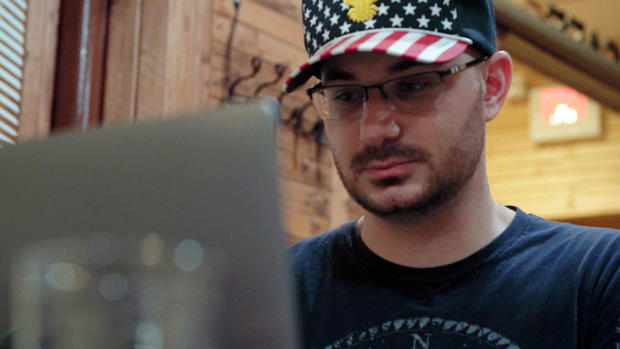Documentary explores the disturbing appeal of QAnon
REVERB is a documentary series from CBSN Originals. Watch the latest episode, “The QAnon Effect,” in the video player above. It premieres on CBSN Sunday, Nov. 29, at 8 p.m., 11 p.m. and 2 a.m. ET.
John, a 30-year-old Pennsylvania man who asked us not to use his last name, has a collection of baseball hats that are all variations on a theme. Each includes some reference to President Trump, like “Trump 2020” or “44,” and each has the letter “Q” pinned or sewn on.
“Who is Q? Well, nobody really knows for sure,” John told CBSN Originals. “But Q has told us that at its core, Q is 10 people that are very close to the president.”
The “Q” John refers to is the shadowy central figure in a web of conspiracy theories known as QAnon. Since 2017, Q has been dropping cryptic clues online that adherents eagerly interpret and expound upon, weaving an elaborate tale of a nefarious group, or cabal, of global elites that supposedly control the world and manipulate the media while engaging in a satanic child trafficking operation involving Hollywood celebrities and Democratic politicians.
Followers like John believe Q is an undercover group of government agents with top-secret clearance, and they refer to themselves as “anons.” They’re convinced that President Trump is destined to expose and defeat the evil cabal. Critics have likened the group to an apocalyptic religious cult, and the FBI has warned of the growing threat of violence from “conspiracy theory-driven domestic extremists” including QAnon.
In the lead-up to the 2020 election, a Yahoo News/YouGov poll found that nearly half of Trump supporters had heard of QAnon, and of those, more than a third said they believe at least some of it is true. When asked about the baseless claim that “top Democrats” are involved in child sex-trafficking, half of all Trump supporters agreed.
Mr. Trump himself has refused to condemn QAnon, claiming at a televised town hall in October that he knows “nothing about it” but has heard “they’re very strong against pedophilia, and I agree with that.”
“There’s a big obsession among the right wing, this idea that people are out there trying to get your children,” Elliot Borenstein, a professor at NYU who studies conspiracy theories, told CBSN Originals. “I think it’s quite dangerous. I mean, if you see what happened with the Tea Party, which started out as this fringe that people could make fun of very easily, it basically took over most of the Republican Party. But QAnon is much further on the fringe than the Tea Party was or is.”
According to Borenstein, QAnon’s spread from the dark corners of the internet into mainstream American culture and politics is primarily disturbing because, at its core, it signals a deep societal grievance.
“A conspiracy theory is implicitly trying to address grievance, suffering, pain that people are feeling and they feel that are being neglected by the mainstream,” he said.
“I think anytime you have a popular conspiracy theory the question you should be asking is, What is going on in our country that makes anything like this appealing? What is wrong?”
An America strained by bitterly divisive politics, economic insecurity and the coronavirus pandemic has proven to be fertile ground for QAnon.
“I think this is a very chaotic time, there’s a lot of people who are very afraid. It seems like the world is ending at points and [QAnon] offers an organization to the chaos,” said Alyssa Kann, a researcher at the Atlantic Council’s Digital Forensic Research Lab.
“2020 has been an outstanding year for the Q movement,” said John. “We’ve never had more support as we have this year. I think it’s been at a fever pitch. You see what’s going on with the COVID and being forced to do things that are unconstitutional, like wearing masks, and they’re talking about mandatory vaccines in a lot of blue states, and that scares a lot of people.”
Data from digital researchers shows that QAnon content spiked in particular during the early coronavirus lockdowns in the spring of 2020. Even after mainstream social media platforms began cracking down on QAnon-related accounts — Twitter banned them in July and Facebook and YouTube did so in October — people like John continue to spread their beliefs through camouflaged account names and hashtags.
A survey in October 2020 found about 1 in 10 social media users said they had friends or family members who’d engaged with QAnon content online.
In recent months, QAnon followers have organized and attended protests against Hollywood studios like Disney and politicians like Hillary Clinton, claiming to be taking a stand against child trafficking. They’ve also been elected to office: about two dozen candidates who’d shown some degree of support for QAnon ran for Congress and two of them won.
Asked about President Trump’s loss in the 2020 election and what’s next for QAnon, John said he was not worried about it.
“They are trying to steal the election from us. It’s all going to be exposed,” he said. “I’m not disappointed at all. In fact, I’m really energized by it, to be honest with you.
“We’re not going anywhere. In fact, we’re just getting started.”
According to Borenstein, the specifics of the QAnon theory may change but the issues underlying it aren’t going to go away anytime soon.
“QAnon might not survive two years from now, but there’ll be something else, or QAnon will have renamed itself or have taken on some other form,” he said. “People don’t change their minds very easily about anything. QAnon and conspiracy theories and political affiliations, these are all huge investments. They’re psychological, emotional investments.”
For those hoping to coax believers away from such extreme conspiratorial thinking, Borenstein says, “The best approach is an empathetic relationship based long-term engagement with the person who has gone down this particular rabbit hole. And it’s largely not about what they believe, but talking about the things that they’re afraid of.”
*** This article has been archived for your research. The original version from CBS News can be found here ***



